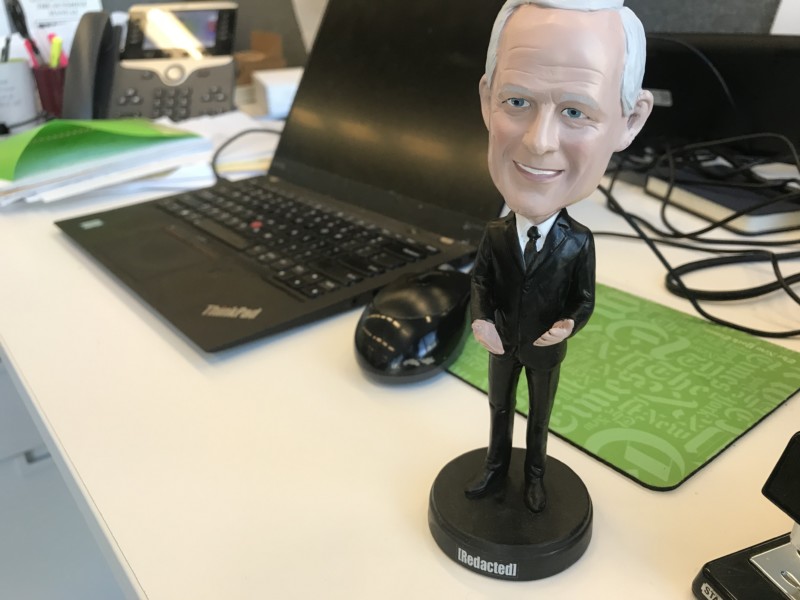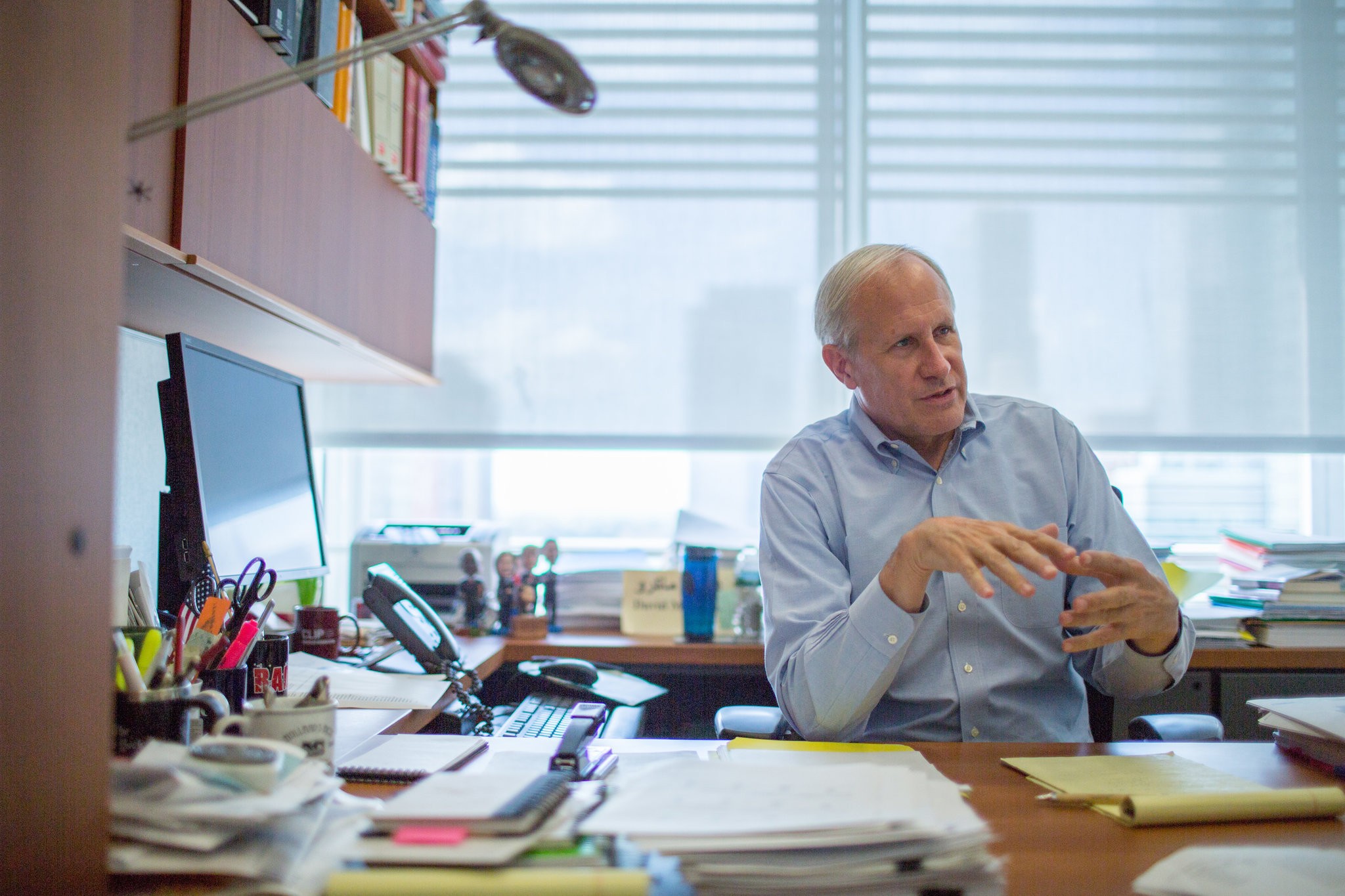Late one Wednesday night, in October 2016, The New York Times received a letter from longtime Trump attorney Marc Kasowitz. Referencing a story from the day prior, about two women who said they had been sexually assaulted by the would-be president, Kasowitz accused the newspaper of libel and threatened to sue. He demanded that the Times retract the story and issue an immediate apology.
It took David McCraw, the newsroom lawyer at the Times, about 45 minutes to write a response the following morning, in between a meeting about physical security at the Times’s headquarters and another about a lawsuit in Texas.
In his reply, McCraw first disputed Kasowitz’s definition of libel, explaining that the Times could not possibly tarnish Trump’s reputation on the matter of his treatment of women any further than Trump had tarnished it himself. He defended the diligence of the Times’s reporting and made the case that the story was a matter of great public importance. “If Mr. Trump disagrees,” McCraw concluded, “if he believes that American citizens had no right to hear what these women had to say and that the law of this country forces us and those who dare to criticize him to stand silent or be punished, we welcome the opportunity to have a court set him straight.”
ICYMI: The FBI’s secret investigation of a journalist
Because the Trump team had made its letter public, McCraw thought it best for the Times to return the favor in kind; his reply was published on the Times’s website, as well as in the Friday morning paper. It was just 17 sentences long, but the letter would make a minor celebrity of McCraw in the coming days. In the Times newsroom, reporters and editors gave McCraw a standing ovation. Megan Twohey, one of the reporters whose story McCraw had defended, printed and taped the letter up on her refrigerator at home. “To have our lawyer write something like that was incredibly reassuring and inspiring,” Twohey says.
Newsroom lawyers tend to occupy an unsavory place in journalism mythology. Stereotypically, they’re the ones who fret incessantly, move to kill stories, and swoop in at the eleventh hour to tell reporters, “No.” At the Times, McCraw is known for taking the opposite approach. He lets reporters know what the law prohibits, and he does everything he can to keep them out of trouble. But more often than not, in McCraw’s view, the law should open doors to stories, not keep them shut. “If I start with, ‘How am I going to get this published?’ as opposed to, ‘How am I going to keep us from getting sued?’ I find we end up in a much better place,” McCraw says.
Over nearly 17 years at the Times, McCraw has developed a rare trust in the newsroom. Though he is also a vice president in his role, multiple reporters described McCraw to CJR as “one of us,” explaining that they were more likely to run into McCraw eating oatmeal in the employee cafeteria or wandering the newsroom than to have to seek him out on an upper floor of the building. On a walk of the newsroom with McCraw, on a recent weekday afternoon, reporters approached, notebooks in hand. Some had questions that McCraw fielded off the top of his head. Most just wanted to say hello.
McCraw, who is 64, grew up in rural Monticello, Illinois, the son of two veterans who had both served in Europe in World War II. It was a conservative upbringing, at a time when many Democratic leaders were winding up in prison; and from an early age, it impressed McCraw to see journalism serve as a natural counterbalance to corruption. “A distrust of power is the ultimate conservative value,” McCraw says. “It used to be, at least.” In high school, McCraw attended a speech by Peter Arnett, the famed Vietnam war correspondent, at the University of Illinois at Urbana-Champaign. “Listening to what the reporters were going through to overcome disinformation coming from the Pentagon and military commanders, I found that really inspiring,” McCraw says.
McCraw studied journalism at University of Illinois, and worked as a copyeditor before getting a second degree and, eventually, becoming a journalism professor at Marist College in Poughkeepsie. To advance in academia, McCraw was advised that he would need another advanced degree; a dean at Marist suggested law. As it happened, McCraw had never really thought much of himself as a reporter; he liked writing, but he was shy and always anxious on the phone. The law proved an unexpected fit. In 2000, when he got wind that an in-house job had opened at the New York Daily News McCraw jumped at the opportunity. Two years later, the newsroom lawyer at the Times, Adam Liptak, decided conversely that he wanted to become a journalist. At 48 years old, McCraw was hired.
It was a thrilling time to be a lawyer to journalists, McCraw recalls. In the wake of the September 11th attacks, the New York City Fire Department had commissioned an oral history project to capture the raw testimonies of hundreds of firefighters, paramedics, and others. McCraw, along with another Daily News veteran at the Times, Jim Dwyer, lobbied for those records to be made public, but the Bloomberg administration refused. Some at the Times worried about the optics of pressing further, particularly at such a sensitive time. But McCraw’s brief stint at the Daily News had left him a pugilistic disposition towards city government. “So, we sued the city,” McCraw says. In 2005, after several rounds of litigation, the Times won access to over 12,000 pages of the oral histories, as well as written logs of calls placed to the city’s emergency dispatch system on September 11th, which provided powerful and moving accounts of the events of that day.
ICYMI: BuzzFeed reporter discusses controversial scoop
As the US drove headlong into a global war on terror, it was McCraw who notarized the paperwork for a generation of reporters who would embed with military units in Afghanistan, Iraq, and elsewhere. McCraw says he viewed it all through outside eyes, with a sense of amazement. “I thought, ‘These are the people who are going to tell this story to the world, from a place that’s hard to imagine.”
In the years since, McCraw has helped guide the Times through legal minefields including reporting on Harvey Weinstein, the Snowden disclosures, Stuxnet, a joint US-Israeli program designed to sabotage Iranian nuclear facilities which would lead to one of the largest federal leak investigations in US history, and the recent social media privacy scandals. Freedom of information suits—less common in the early aughts but a matter of routine today—have led to high-profile government disclosures about the messaging machine that helped the military sell its war in Iraq and the exposure of troops in that war to chemical weapons, and, more recently, the opulent tastes of key Trump administration officials. In Obama’s eight years in office, the Times lodged over 30 freedom of information lawsuits against the administration, more than any other media organization. Fox News was second, with five.
Reporters often bring McCraw in near the beginning of a reporting project. In the spring of 2017, when national security correspondent David Sanger, with William Broad, prepared to publish a story about a classified US program scuttling North Korean missile tests, it was not clear how the new Trump administration might respond to such a sensitive exposé. To mitigate the reporters’ legal jeopardy, McCraw came up with an idea to publish a second story, Sanger says, compiling details of the secret program which were contained in years of unclassified policy documents, budget requests, and speeches. If the administration called foul, the idea went, the Times could simply point to already-public information which, in aggregate, told the same story.
In the end, even as Trump railed on Twitter against leaks and leakers, the story flew without incident. “I’m not sure, without David’s help, that we would have wound up as safe as we did on that,” Sanger says.

A gift to McCraw from the Times’s First Amendment Fellows, on the tenth anniversary of the fellowship program.
One of McCraw’s biggest priorities in recent years has been physical safety at the Times. In years past, he routinely intervened with angry callers and letter-writers to the newspaper. (“Getting a call from a lawyer was usually enough to help people step back from the line,” he says.) But as the national discourse has toxified, calls and messages to the Times have become both more numerous and more threatening. Of late, McCraw has helped coordinate the development of a hotline for Times employees who receive threats, aided employees in filing reports with the police, and in some cases commissioned security audits at reporters’ homes.
Why it would fall to a newsroom lawyer to take point on security matters is somewhat an accident of history, McCraw explains. In 2008, when a Times reporter was kidnapped in Afghanistan, McCraw emerged as a person with both the trust of the newsroom and the know-how to quickly leverage corporate resources; he was a natural, if unexpected, fit for the role of crisis response manager. “We were also dealing a lot with government and law enforcement,” McCraw says. “It seemed like a lawyer should know how to do that.” Another kidnapping in Afghanistan followed shortly thereafter, and in 2011 four Times reporters were detained in Libya. McCraw does not profess to be an expert, however. With threats today intensifying as much at home as abroad, McCraw has moved to professionalize security at the Times and has helped lead the search for a full-time security director.
More than most in the media industry, McCraw was reluctant to declare a state of emergency when it came to Trump’s attacks on the press. Over the past decade and a half, he had learned the power of the First Amendment; he was sure it would prove resilient to Trump, too. “First Amendment lawyers are historically alarmists,” McCraw says. “We believe in slippery slopes. But I really thought people’s concerns were overstated.” As the attacks continued, however, both real and rhetorical, McCraw realized that there was far more at stake than legal precedent. “The power of the press comes from having people read, believe, and act,” he says. “If you break that down, you’re in a very dangerous place.”
As the only in-house lawyer to the newsroom, including for Times bureaus worldwide, McCraw is always on-call. He wakes before 5am and immediately sets to work responding to emails. Most days, he arrives to the Times by about 7:30am, a quiet hour which gives McCraw time to write—a defense in a lawsuit, for example—before the pace in the building picks up. He also teaches law classes at Harvard and NYU. The release this week of his book, called Truth in our Times, adds one more thing to McCraw’s pile.
It all leaves McCraw with little time for himself. He follows the Yankees closely. He reads when he has the time. He used to attend competitive Scrabble tournaments around the country—for a while, he averaged 370 points per game. If the hustle bothers McCraw, it doesn’t show. “This is something worth being tired for,” he says.
ICYMI: Media Matters protests as Fox News makes pitch to advertisers
Andrew McCormick is an independent journalist and former CJR Delacorte Fellow. His work has appeared in the New York Times, The Atlantic, the South China Morning Post, and more. Follow him on Twitter @AndrewMcCormck.

